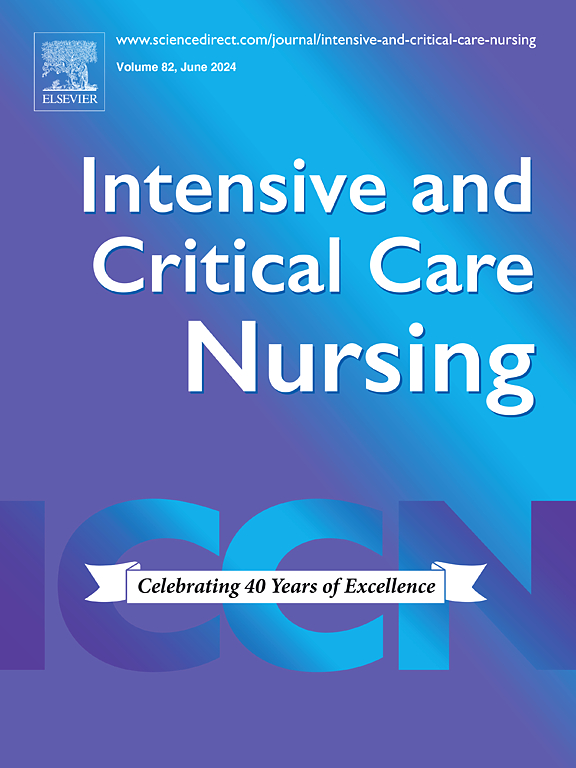从临床医生的见解重新连接与危重疾病的幸存者:一项国际定性调查。
IF 4.7
2区 医学
Q1 NURSING
引用次数: 0
摘要
背景:在过去的二十年中,已经实施了多种干预措施来支持重症监护幸存者,每种干预措施在改善生活质量和临床结果方面都取得了有限的成功。对纵向重症康复护理的评估有限,包括对医疗保健系统或临床医生的任何相应影响。本分析的目的是探讨临床医生与危重疾病幸存者重新联系的经验,以及这种重新联系被认为在医疗保健系统内产生的后续影响。方法:我们对来自不同机构的临床医生进行了深入的半结构化访谈,进行了一项国际定性调查,包括英国国家卫生服务机构、美国退伍军人事务部和美国安全网医院。临床医生代表不同的专业学科、专业和经验。访谈采用框架分析法进行分析。结果:对19名临床医生进行了访谈。在这些受访者中,16名(84%)是女性,大多数在重症监护环境中工作(n = 10, 53%)。在整个访谈中,总共有16个医疗保健系统设置。在确定如何与幸存者重新建立联系之后,确定了六个主题,并将其分为两个领域。第一个领域是重新连接对临床医生的影响,包括:缓解情绪衰竭;工作场所的意义;重视员工。第二个领域是对重症监护系统和护理服务的影响,包括护理服务的人性化;为决策提供更丰富的见解;并提供数据来推动护理的改善。结论:这项多中心国际调查表明,危重疾病幸存者和临床医生之间的重新联系对临床医生的健康和危重护理环境中的护理提供有潜在的好处。临床意义:本研究从临床医生的角度探讨了重症监护幸存者与临床医生之间的重新连接经验。它已经显示出对临床医生的健康以及在重症监护环境中提供护理的潜在益处。在未来的研究中应该考虑重新连接以及如何将其纳入重症监护服务。本文章由计算机程序翻译,如有差异,请以英文原文为准。
Insights from clinicians on reconnecting with survivors of critical illness: An international qualitative investigation
Background
Over the last two decades multiple interventions have been implemented to support critical care survivors, each with limited success in improving quality of life and clinical outcomes. There has been limited evaluation of longitudinal critical illness recovery care, including any corresponding impact on the healthcare system or clinicians. The objective of this analysis was to explore the experience of clinicians reconnecting with survivors of critical illness and the subsequent impact that this reconnection was perceived to have within the healthcare system.
Methods
We conducted an international qualitative investigation using in-depth semi-structured interviews with clinicians from varied settings, including the UK National Health Service, USA Veteran Affairs, and USA Safety Net Hospitals. Clinicians represented different professional disciplines, specialities, and experience. Interviews were analysed using Framework Analysis.
Results
Nineteen clinicians were interviewed. Of those interviewed, 16 (84 %) were female, and the majority worked in critical care settings (n = 10, 53 %). In total, 16 healthcare system settings were represented across the interviews. Following the identification of how reconnection with survivors was operationalised, six themes were identified, and categorised into two domains. The first domain was the Impact of reconnection for clinicians and included: mitigation against emotional exhaustion; workplace meaning; and value placed on staff. The second domain was the Impact on the critical care system and care delivery and included humanisation of care delivery; richer insights to underpin decision-making; and the provision of data to drive improvements in care.
Conclusions
This multi-centre international investigation suggests that there are potentially benefits for clinician wellbeing as well as the delivery of care within the critical care setting from reconnection between survivors of critical illness and clinicians.
Clinical Implications
This research has explored the experience of reconnection between critical care survivors and clinicians from a clinician perspective. It has shown potential benefits for clinician wellbeing as well as the delivery of care within the critical care setting.
Reconnection and how it could be incorporated into critical care services should be considered in future research.
求助全文
通过发布文献求助,成功后即可免费获取论文全文。
去求助
来源期刊

Intensive and Critical Care Nursing
NURSING-
CiteScore
6.30
自引率
15.10%
发文量
144
审稿时长
57 days
期刊介绍:
The aims of Intensive and Critical Care Nursing are to promote excellence of care of critically ill patients by specialist nurses and their professional colleagues; to provide an international and interdisciplinary forum for the publication, dissemination and exchange of research findings, experience and ideas; to develop and enhance the knowledge, skills, attitudes and creative thinking essential to good critical care nursing practice. The journal publishes reviews, updates and feature articles in addition to original papers and significant preliminary communications. Articles may deal with any part of practice including relevant clinical, research, educational, psychological and technological aspects.
 求助内容:
求助内容: 应助结果提醒方式:
应助结果提醒方式:


